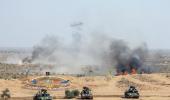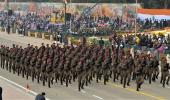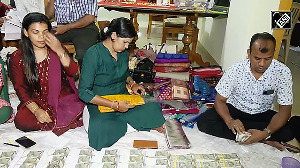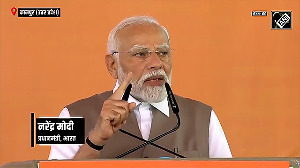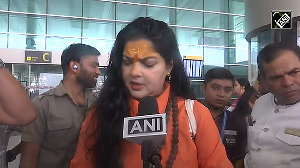Integrated mega exercise 'Bharat Shakti' at Pokhran has given a "strategic message to the adversaries" about the combat potential of India's armed forces, sources in the defence establishment said.

Homegrown aircraft roared in the air while indigenously built battle tanks and artillery guns spewed fire dominating the arid terrain of Pokhran in Jaisalmer district during the exercise held on March 12 which was witnessed by Prime Minister Narendra Modi and the country's top military brass.
"The live fire and static display have given a strategic message to the adversaries about the combat potential of our armed forces in terms of capability and capacity," a source in the defence establishment said.
The exercise was organised under the aegis of the Indian Army.
The synergised demonstration of indigenous defence capabilities during 'Bharat Shakti' is a "testimony to its commitment towards modernisation through indigenisation," the sources said.
Roars of light combat aircraft Tejas and ALH Mk-IV filled the air while Main Battle Tank Arjun, K-9 Vajra, and T-90 Bhishma tanks, and Dhanush and Sharang artillery gun systems ruled the firing ranges on the ground. Pinaka rocket system in action drew huge cheers from the crowd.
'Bharat Shakti' exercise was held for about 50 minutes during which India showcased the prowess of its indigenous defence equipment.
The field firing ranges at Pokhran in Rajasthan is located near the international border.
The exercise showcased India's military prowess and integrated multi-domain operations of the three services and the "shock and awe" impact that the armed forces seek to achieve in an operational situation with manoeuvre and fighting capabilities.
As awestruck spectators watched the exercise in Rajasthan, Modi said "Pokhran has become witness to the trinity of India's aatmanirbharta, belief and self-pride".
Defence Minister Rajnath Singh, Chief of Defence Staff Gen Anil Chauhan, Navy chief Admiral R Hari Kumar, IAF chief Air Chief Marshal VR Chaudhari and Army chief Gen Manoj Pande and Rajasthan Chief Minister Bhajan Lal Sharma also attended the tri-services firepower and manoeuvre exercise, a first-of-its-kind on such a scale.
"Exercise 'Bharat Shakti' not only displayed the indigenous defence capability of the armed forces, it also displayed the integration and jointness that is being achieved in various aspects like communications, training, inter-operability and logistics," the source added.
Coordinating actual fire and manoeuvre drills by various arms and services is essential requirement of such large-scale exercises, which gives "first-hand experience of dealing with such issues in actual battles".
All these activities also include, move of large number of equipment and weapon pieces for firing and display, which involves "coordination with other two services at the highest level", sources in the military establishment said.
While efforts are in place and extensive plans are being made to "orchestrate integration and bring jointness among the services", 'Bharat Shakti' epitomises these efforts and highlights the contributions of the Indian Army towards achieving the much-awaited integration, they said.
The exercise showcased an array of indigenous weapon systems and platforms as a demonstration of the prowess of a rising India, premised on the nation's 'Atmanirbharata' initiative, the sources added.
For live fire demonstration, the efforts by the Army as being the lead service, "are visible". Starting with meticulous planning in utilising the available resources in Pokaran for integrated firing which can be attributed to "battle space management akin to actual operations", they said.
Synergy in ISR (intelligence, surveillance and reconnaissance), firepower and communications was evident during the conduct, another source said.
"Air space management in coordination with the Indian Air Force is also a critical requirement in battle where various air assets of the Army and the Air Force would be using the air space simultaneously which needs clear demarcation of boundaries, identification drills and fool proof communication systems," the source added.
While live firing was "awe-inspiring", static display of various equipment and weapons in the display arena gave a "holistic view of indigenous platforms of the armed forces, they said.
Equipment and weapons on display included various drone systems and counter- drone systems, simulators, communication systems, radar systems, multi-mode hand grenade (MMHG), 3D-printed bunkers, artificial intelligence-based satellite imagery analysis system, among others were on display.
"'Bharat Shakti' also signalled to the world military community to subscribe to the large defence manufacturing potential possessed by the India," the source said.
Modi in his address at Pokhran also said, "The roar of aircraft mid-air, and valour displayed on ground during 'Bharat Shakti' exercise is the call of a 'new India' (naye Bharat ka aavhan hai)".
"This is Pokhran, which witnessed India's nuclear power, and today here we are also seeing the strength of 'Swadeshikaran se Sashaktikaran' (from indigenisation to empowerment). Today, this celebration of 'Bharat Shakti' is taking place in Rajasthan, the land of bravery, but its echo is being heard not only in India but in the whole world," he said.

